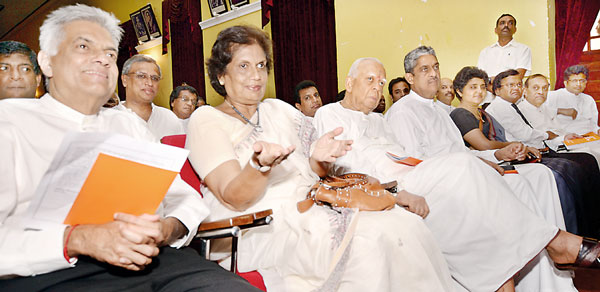Zacki Jabbar –
A draft constitutional amendment abolishing the Executive Presidency within a definite time frame and reintroduction of the 17th Amendment would be the manifesto of the Oppositions Common Presidential candidate Leading Constitutional lawyer Jayampathi Wickremeratne, addressing a meeting organised by the National Movement for Social Justice (NMSJ) at the New Town Hall yesterday, calling for the abolition of the Executive Presidency said that a draft constitutional amendment was in the making and would be made public soon.
A road map for constitutional change would be presented to Parliament within a month of the Common Candidate being elected President and if the need arose a referendum would be held within six months. Thereafter, the incumbent President would lose his position and Parliament would elect a new President from among its members.The amendment would also include the reintroduction of the 17th Amendment to the Constitution which had established all the Independent Commissions, he observed.
Wickremeratne emphasised that they would project the candidacy and its objectives and not their candidate at the next presidential election.
Chairman of the NMSJ, Maduluwawe Sobhitha Thera, who was tipped to be the Oppositions Common Presidential candidate, said that the three most important issues that need to be addressed urgently was the abolition of the Executive Presidency, reintroduction of the 17th Amendment and changes to the electoral system.
The unbridled powers vested in the Executive Presidency was such that the incumbent could get on the street and shoot as many people he or she wished and still not be produced before a court of law, he noted.
Recalling the words of the late LSSP leader Colvin R.de Silva, the Thera said, “This Constitution is such that even if the President goes mad he or she cannot be chased away.”
The only thing that Sri Lanka had become self sufficient in under the Rajapaksa regime was narcotic drugs, he noted adding that there was an unprecedented rise in robberies, rapes, murders and corruption.
Law Professor Deepika Udugama said that all the three Constitutions that had been promulgated, had been done unilaterally for the benefit of and with a view to promoting the ideals of individuals.
India and South Africa had, she observed, established Constitutional Assemblies and engaged in countrywide consultations prior to the drafting of their Constitutions and it was important that Sri Lanka even at that stage adopted a similar method.
The Island
